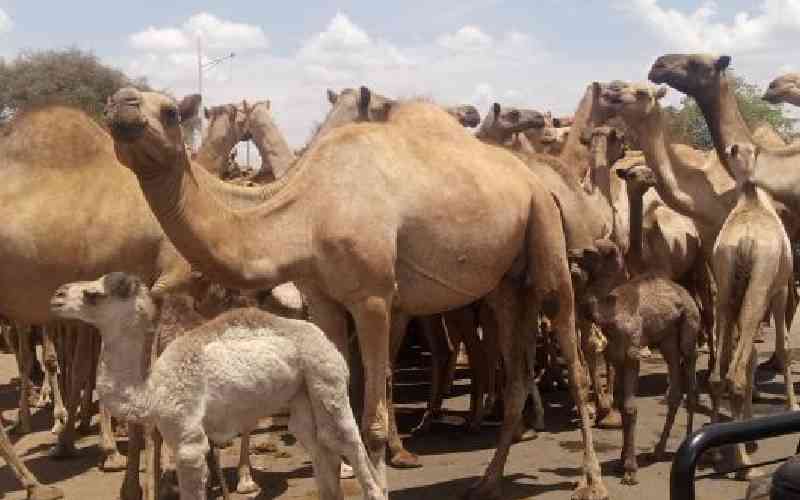
Gladys Mollah says that the first time she took a sip of camel milk in Isiolo town, she had to look at her glass twice to see if somebody had touched the glass with charcoal-stained fingers.
When she inquired about it, she was told that the milk smelled like charcoal because of the sun-burnt plants/trees camels eat. In fact, locals believe that some of the wild plants camels eat are medicinal in nature.
"We believe camel milk is a medicinal product and not food," says Ahmed Daud, a camel farmer in Laisamis, Marsabit county. "Camels eat cactus, aloe vera, hardened plants like acacia, thorny trees, salty shrubs, and twigs, and barks of different trees."
Mercy Njeri, a nutritionist, says camel milk is rich in Vitamins A, B, C, D, and E, and calcium. It also contains high levels of an insulin-like protein that passes through the stomach without being destroyed.
"Although camel milk has such values it is less appreciated outside the pastoral areas of northern Kenya," says Mello Achieng, another nutritionist based in Nairobi.
She adds that camel milk is low in cholesterol, lactose, and sugar and high in minerals, vitamins, and proteins such as lactoferrin and lactoperoxidase.
The milk, she says, has anti-bacterial, anti-fungal, and anti-viral qualities and that its richness in calcium and phosphorous makes it excellent for pregnant women.
"Nutritionally, camel milk is slightly lower in total fat and saturated fat but equals cow's milk in total calories and proteins. It has more iron and Vitamin C than cow milk," Njeri says.
One disadvantage of camel milk is that it costs more than other types of milk as a 300ml glass goes for Sh200 compared Sh50 for cow milk of the same quantity, according to Mr Daud. He says this is so because the demand outweighs the supply.
The product is not free from side effects either. Ms Achieng' says it can cause bloating and abdominal pain among other symptoms.
Mr Daud, however, says the side effects are tolerable compared to the product's health benefits. He says that any other products derived from the camel, such as urine, meat, and milk have similar health benefits.
Khadijah Waqo, a resident of Marsabit says those who feed on camel milk do not easily get skin rashes, fungal infections, and boils on their bodies.
"We grew up knowing from our parents and grandparents that camel milk helps babies develop immunity. Now, we know that it supplies breastfeeding mothers with nutrients needed in their milk for their babies to grow healthy," Ms Waqo says.
 The Standard Group Plc is a multi-media organization with investments in media
platforms spanning newspaper print
operations, television, radio broadcasting, digital and online services. The
Standard Group is recognized as a
leading multi-media house in Kenya with a key influence in matters of national and
international interest.
The Standard Group Plc is a multi-media organization with investments in media
platforms spanning newspaper print
operations, television, radio broadcasting, digital and online services. The
Standard Group is recognized as a
leading multi-media house in Kenya with a key influence in matters of national and
international interest.









